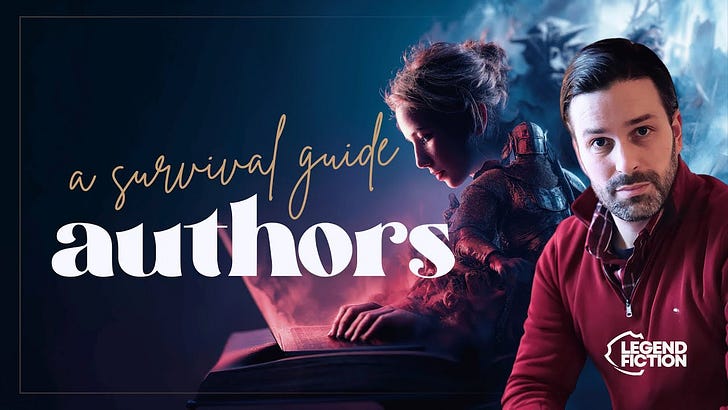10 Reasons to Be Nice to Authors... Or, A Field Guide to Living with Chaos Wrapped in Cardigans and Coffee
Please Read Before Interacting With an Author Ever Again.
Let’s be honest: authors are weird.
Not “quirky like your aunt with the seven cats” weird. We’re talking “chronically haunted by fictional people and compelled by ancient muses at 3 a.m.” weird.
To the untrained eye, they might seem like ordinary humans who enjoy coffee and cardigans. But step closer and you’ll realize you’re actually living with a myth-making machine that is currently juggling six alternate timelines and crying over the death of someone they made up.
This guide? It’s for the brave souls who live with, love, or accidentally married a writer.
But really—it’s for the writers themselves. To laugh. To be seen.
To maybe forward this to someone with the subject line: “Please Read Before Interacting With Me Ever Again.”
1. Authors Are Actually Narnian Wardrobes in Disguise
From the outside, an author appears harmless—sitting still, sipping tea, maybe muttering to themselves in iambic pentameter.
But inside? Absolute, unrelenting multiverse mayhem.
They’re not ignoring you—they’re currently hosting an emergency summit between seven interstellar monarchs, a time-traveling assassin, and a goat who just became sentient. Their brain is a wardrobe, sure—but one filled with lightsabers, ancient runes, cosmic betrayals, and at least three wars that need ending right now.
Helpful Insight:
Don’t mistake stillness for serenity. The author mind is not “quiet,” it’s symphonic. Learn to respect the pause. The best ideas often come in the gaps between words. Stillness is sacred.
Habit for Loved Ones:
Before interrupting an author who looks zoned out, ask: “Are you in Narnia right now?”
If yes, back away slowly and offer snacks at the door.
2. They Are Host to a Small, Conflicted Population
At any given moment, your beloved author is carrying about 17 characters in their mind. Four are plotting a revolution. Three are in a love triangle. Two are possibly dead. And all of them want screen time.
When they stare into the distance, they’re not bored. They’re conducting therapy between a necromancer and his long-lost undead mother.
Helpful Insight:
This inner cast is a blessing, not a bug. It means the writer is doing the deep human work of holding perspectives, wrestling with contradiction, and seeing from the inside out. This builds empathy—and sometimes insanity.
Habit for Loved Ones:
Ask open-ended questions like, “What’s your favorite character dealing with today?” Not only will they light up—they might actually decompress. Bonus: you learn the lore without having to read a 400k-word draft.
3. Their Default Mode Is Crisis Lightly Seasoned With Magic
Sometimes, an idea ambushes them in the shower. Other times, it waits until a funeral. Inspiration has terrible timing.
This is why your author has 87 notes in their phone, a voice memo of them yelling “the tree is the key!” at 2:17 a.m., and a haunted look at brunch.
Helpful Insight:
Inspiration often breaks things before it builds. Writing is less like painting and more like alchemy—it requires fire, unmaking, and rebuilding. Interruptions can feel like losing the thread of reality.
Habit for Loved Ones:
Avoid sudden schedule changes when a writer is “in the flow.” Respect the writing time—even if it looks like they're just staring at a wall. That wall is the crucible of their entire fictional universe.
4. Their Characters Are Real. Like, Really Real.
They’ve mourned fictional deaths harder than some actual relatives. They’ve argued with someone who technically doesn’t exist while brushing their teeth. And yes—they’re in a complicated emotional affair with a pirate priest they invented during a caffeine spiral.
Helpful Insight:
This is a form of emotional truth-processing. Writers often explore parts of themselves through their characters. What looks like melodrama is often deep work in disguise.
Habit for Loved Ones:
When they say “I think I have to kill her,” don’t call the cops. Just nod, pour tea, and say, “Tell me why.” You’re now their unofficial therapist. Congratulations.
5. They Are Basically Low-Level DID Actors
You’ve seen them pace the living room mid-conversation, changing accents, stabbing the air with a pen, and monologuing about betrayal. This isn’t possession. This is rehearsal.
Authors often become their characters to get the voice right. It’s not weird—it’s method.
Helpful Insight:
This is a way to embody empathy. Stepping inside another mind, another accent, another life—it’s how stories grow limbs and lungs. This is practice for compassion in the wildest way.
Habit for Loved Ones:
Don’t mock the voices. (Unless they’re trying a Scottish accent and it’s really bad—then gently roast them.) Otherwise, accept that dinner may involve a duel.
6. Their Emotional Support System Is Entirely Fictional
When things get hard, they turn to a sarcastic elf, a long-suffering magical mentor, or a sassy AI for comfort. No judgment. These inner allies are often more available than real people.
Helpful Insight:
Fictional relationships can be healing. They represent ideals—wisdom, courage, unconditional acceptance—that writers may not find in the wild. Let them lean on those companions. They’re real in all the ways that matter.
Habit for Loved Ones:
Ask them which character helped them through a hard time. Don’t say “they’re not real.” That’s like telling a musician their song isn’t alive.
7. When the Words Don’t Come, It Hurts
Writer’s block isn’t laziness. It’s soul-silence. It feels like being locked out of your own house while the party goes on without you.
They aren’t being dramatic—they’re grieving the loss of connection to the very thing that keeps them sane.
Helpful Insight:
In these moments, kindness matters more than solutions. Don’t try to fix it. Just be there. Writing is how they metabolize life—when it’s blocked, life gets stuck.
Habit for Loved Ones:
Leave notes that say, “I believe in your story. It matters.” One line can be the bridge back into the work.
8. They’re Actively Dissociating—With Purpose
Yes, they look like they’re staring into space while the kettle boils. That’s because they’re watching a phoenix battle a serpent in a dreamscape shaped like their childhood kitchen.
This is functional dissociation. Also known as “plotting.”
Helpful Insight:
This mental drifting is not avoidance—it’s access. It’s how subconscious patterns rise to the surface. It’s dreamwork. Daydreaming is often where the best breakthroughs happen.
Habit for Loved Ones:
Don’t snap them out of it unless there’s a fire. Instead, try asking, “Where were you just now?” You might be invited into something astonishing.
9. Rejection Is the Daily Breakfast Cereal
They’ve been ghosted by agents, ignored by editors, and read by three people (one of whom is their mom and the other was “busy”).
Writing means signing up for perpetual emotional whiplash. And yet… they show up. Again. And again.
Helpful Insight:
Resilience is forged in this fire. Every no is part of the mythic test. What matters is not the rejection itself, but the return to the page. Honor the courage that comes with staying.
Habit for Loved Ones:
Celebrate the effort, not the outcome. When they get a “no,” take them out for cake. Make the ritual about bravery, not results.
10. They’re Trying to Save the World—One Scene at a Time
This isn’t just storytelling—it’s soul work. Writers are modern mythmakers. They’re shaping worlds so others can survive this one. They write not for attention, but because they must.
If they’re weeping over a death scene from a story they haven’t written yet, just know: that pain is sacred. They’re mid-rescue mission—for someone, somewhere, who will one day need that story.
Helpful Insight:
Stories are how we understand who we are. Authors translate the unspoken, the invisible, the lost. That work is exhausting—but it’s also sacred.
Habit for Loved Ones:
Sometimes, the best support is silence. A warm meal. A long hug. A whispered, “What you’re doing matters.”
Why the World Needs Authors (Even if They Keep Forgetting Where They Put Their Tea)
Authors aren’t just people who tell stories.
They are the ones among us who sit still long enough to hear what the world is trying to say beneath all the noise. They carry the burden of attention—of noticing patterns others miss, of feeling too much, of translating silence into sentences.
They are emotional cartographers—mapping the inner lives of humanity so we can find our way through heartbreak, hope, and all the spaces in between.
They take the raw materials of memory, myth, pain, humor, wonder—and they shape them into something that can be shared. Something that can survive. Something that might just change someone’s life, or at the very least, help them make it through Tuesday.
Writers help us feel seen when the world tries to forget us.
They hold up a mirror, not just to reflect—but to reveal.
And that’s no small thing.
They do it without guarantees. Without applause. Often without sleep.
They do it because something in them says, “This matters.”
And it does.
So if you’re living with a writer—if you love one, support one, or are one—here’s the real truth:
They are not broken. They are not lazy. They are not strange for hearing voices, needing silence, or crying over someone who never existed.
They’re struggling along through sacred work—yes, even when it looks like chaos. Wrapped in soft sweaters, surrounded by half-filled mugs and too many notebooks, they might be juggling three side jobs, starting five projects at once, or chasing a dozen new ideas in a single afternoon.
But all of it—all of it—is fuel. It’s how they gather the raw ingredients needed to make sense of a world that rarely does.
Writers are asked—often silently, often without thanks—to see deeper, to feel more, to track what others overlook. That takes a bigger mental kitchen. More supplies. More wandering. More false starts and “Hey, I’ve got a new story idea!” texts at 1 a.m.
They don’t need pressure to “just finish something.” If it matters enough, they will.
What they need is space, support, and someone who understands that soul work takes time, and sometimes the best stories arrive slow—like bread rising in the dark.
They carry the emotional myths of our time.
They give language to what the rest of us only feel.
So the next time you pass by the writer in your life—whether they’re lost in thought or laughing at their own made-up dialogue—remember this:
They’re not just making up stories.
They’re learning how to build soul-shelters for the rest of us to live in.
Let them.
And thank them.
And if you’re an author reading this? Remember: you’re not alone. Your madness has meaning. Your strangeness is sacred. Your story might just save someone’s world.
Now go write it.
After snacks. Always after snacks.
And if this makes you feel seen, maybe you should come check out our community. I think you’ll like it.
Liked these images? You can download them completely free as wallpapers, or do what you like with them.
Authors: What would you add to this?





















I love this. Thank you so much! But, now I'm fearing maybe I'm not quite weird enough... Must work on that.
This is awesome! I was laughing at most of it 😂.
Don’t give up writers!